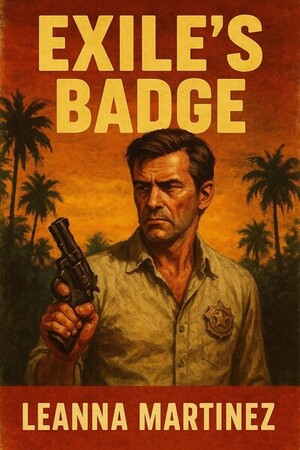Chapter 6:
Smoke and Velvet
Exile's Badge
The tip came from a beat cop who didn’t want his name on anything. “North Beach,” he muttered, eyes fixed on his typewriter. “Club on Grant. Caruso’s people call it a fundraiser. You didn’t hear it from me.”
So Sam went.
The club didn’t look like much from the street, just a green awning and a door that opened onto a narrow stairwell washed in red light. But once inside, the place unfolded into something far more polished. Velvet curtains swallowed the walls, the air thick with cigarette smoke and perfume. A jazz trio played from the corner, trumpet and bass weaving through the clink of glasses, the low murmur of conversation.
The crowd was wrong for a weeknight. Councilmen in tailored suits, priests in Roman collars, businessmen with their mistresses hanging on their arms. No tourists, no drifters. This wasn’t a club—it was a salon of power, dressed up with whiskey and music.
Sam paused long enough to let his eyes adjust, then moved toward the bar. He didn’t belong here. His suit was clean but plain, his tie the same one he’d knotted that morning. He had no mistress, no campaign fund to swell. What he had was a notebook in his coat pocket and the patience to watch.
The bartender gave him a sideways look when he ordered coffee. Most men at the bar were nursing bourbon or gin. Sam wrapped his hands around the small white cup, letting the heat cut through the smoke.
From there, he had the room.
Caruso was easy to spot. He occupied a low table near the stage, not because it was the best seat but because it made him the center of gravity. Men leaned toward him. Women laughed at his comments. His suit was dark and cut to flatter, not flash. He had the easy posture of a man who knew he was welcome everywhere.
Sam watched him laugh with Councilman Vickers, the same councilman who’d traded an envelope in the fog at Hunters Point. Tonight, Vickers looked comfortable, drink in hand, leaning in as though Caruso’s words were gospel.
Next, a bishop in a crisp black cassock slid into the chair at Caruso’s right. Caruso rose, clasped the man’s hands warmly, and bent his head in respect. The bishop smiled, his rings catching the light as Caruso pressed them. The applause from nearby tables was quiet but sincere.
After that, a contractor Sam recognized from the papers joined the group. He’d just landed a fat zoning deal down by the Embarcadero. Caruso whispered something in his ear, and the man laughed, a little too loud, before clinking glasses.
Sam noted it all. The way Caruso listened more than he spoke, the way he nodded at just the right moment, making every man feel important, every woman seen. It wasn’t bluster; it was theater. And Caruso was its only star.
Sam sipped his coffee, the bitter taste grounding him. He thought of Maggie, asleep on the couch most nights, and Emily, certain her father was a hero who could keep the bad men away. He wondered what they’d see if they looked at this room. Would they see a criminal surrounded by accomplices—or a benefactor, a man helping the city shine?
The trio shifted into a slower number. The air thickened. Caruso leaned back in his chair, the king surveying his court, and for a moment his eyes swept the room. They landed on Sam, steady, unhurried, as though he’d expected him to be there all along.
Sam didn’t look away.
Caruso smiled—slow, deliberate, a gentleman’s smile—and returned to his circle.
Sam set the cup down, pulled a folded slip of paper from his pocket, and wrote one line in his tight hand:
Caruso wears the city like a suit.
He slipped it back into his coat and kept watching.
The trumpet faded into a low, steady hum, and Caruso rose from his chair with the ease of a man who never had to ask for the room’s attention. Conversations slowed, laughter softened, the scrape of glass on wood hushed itself.
He didn’t make a speech. He simply lifted his glass and nodded toward the stage. “A word from a friend of mine,” he said, voice carrying like silk across the smoke.
Councilman Vincent Vickers stood, his smile broad, his suit better than the last time Sam had seen him in the fog at Hunters Point. Tonight, Vickers looked like a man proud to wear the city on his shoulders.
“My friends,” Vickers began, “San Francisco is a city on the rise. But some neighborhoods, like Hunters Point, have been forgotten too long. Families there deserve jobs, safety, opportunity. And with the right partnerships, we can bring that future to them.”
He paced slowly, gesturing with his glass as if painting the air with promises. “We’re talking about revitalization. About docks that hum with commerce, streets lit with new businesses, homes where children can sleep without fear. This is the future I see—and I know it’s the future you all believe in too.”
The applause came warm and steady, a wave of sound rolling through the room. Sam heard the subtext beneath the civic language: Hunters Point wasn’t just a neighborhood; it was a dockyard. Whoever controlled the contracts there controlled the lifeblood of the city’s shipping trade. Caruso’s lifeblood.
Around the tables, envelopes began to shift—discreet but practiced. Businessmen slid them across to aides. Priests tucked them into their sleeves before passing them along. A contractor Sam recognized slipped one beneath his plate and raised his glass, eyes meeting Caruso’s across the room.
Caruso never asked for money. He didn’t need to. His smile did the work.
Sam scribbled in his notebook beneath the bar: Revitalization = cover. Caruso wants docks. Political shield. He underlined it twice, knowing no court in the city would care. But the pattern was there, and the pattern mattered.
Back on stage, Vickers leaned forward, his voice dropping into the kind of intimacy that made men believe they were sharing a secret. “We’re not just talking about contracts or construction. We’re talking about dignity. About giving every family in this city a chance to stand tall.”
The room answered with nods, murmurs of agreement, glasses lifted.
Sam watched Caruso through it all. The man said almost nothing. He sat back in his chair, listening, smiling at just the right moment, leaning in to whisper a word or two when someone approached. He didn’t need to dominate the space. He let the councilman carry the flag while he gathered the pledges.
Every handshake was an agreement. Every nod a contract. Caruso turned listening into a weapon. He made every man feel his opinion carried weight, every woman feel her presence was noticed. He didn’t command the room, he owned it by making it believe it owned itself.
Sam’s pen moved again: Charisma. Silence > words. Smiles = signatures.
He tucked the notebook back into his coat and lifted his cup of coffee. The bitterness steadied him against the velvet and smoke.
Caruso caught his eye then, across the crowd. The smile he gave was small, private, like a man acknowledging another player at the table.
Sam didn’t look away.
He pushed the empty coffee cup away and slipped his notebook back into his coat. He’d seen enough for one night of Caruso playing maestro while the city clapped in rhythm. Any longer and he risked turning from a shadow into a spectacle.
He slid a few bills onto the bar and stood, but the bartender caught his sleeve before he could step away. A heavy-bottomed glass appeared on the polished wood, two fingers of whiskey catching the stage lights.
“Compliments of the gentleman at the corner table,” the bartender said, voice low but steady.
Sam didn’t need to look, but he did.
Caruso sat where he always had, surrounded by men with envelopes and women with lacquered nails. He raised his own glass in a small, precise salute, the smile just wide enough to reach his eyes. To anyone else, it was the gesture of a generous host acknowledging a guest. To Sam, it was a message written in amber and smoke.
The bartender lingered a moment longer, leaning in as if sharing something too minor for the room to hear. “Boss says hello, Detective. Hopes the eggs were good this morning.”
The words settled heavier than the glass. Sam felt the edges of the room close in, the red curtains, the velvet booths, the eyes of men who knew exactly who paid their bills. Caruso wasn’t just watching him here. He’d been watching him at home. He knew about the diner Sam stopped at some mornings after dropping Emily at school, the overcooked eggs and burnt coffee that had become a ritual.
Sam stared at the whiskey, the amber surface rippling faintly with the bass line from the trio. He imagined lifting it, drinking it, acknowledging the salute. Accepting the unspoken bargain.
Instead, he left it untouched.
He adjusted his coat, gave the bartender a single nod, and turned toward the door. The velvet curtains brushed his shoulders as he passed, the music fading behind him, swallowed by the thick San Francisco fog that rolled in off the bay.
On the sidewalk, the night pressed close and damp, muffling the city into half-heard echoes, laughter spilling from the club, the rattle of a streetcar on Columbus, the distant wail of a siren cutting through the dark. Sam lit a cigarette, the flame briefly illuminating his face, then started walking.
His footsteps fell in a steady rhythm, louder than the trio he’d left behind. He knew then what Caruso had been telling him, not in words, not even in threats. The game wasn’t played in alleys and warehouses where bullets flew and bodies dropped. It was waged here, in smoky clubs where velvet hid the knives, where smiles were sharper than any blade.
Sam pulled his coat tighter against the fog, exhaled smoke, and kept walking. He didn’t need the whiskey to know what kind of war he’d just stepped into.




Please sign in to leave a comment.